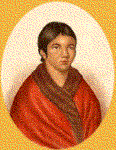
One would like to believe that the great navigators made grand, generous entrances in the New World. But no. Hudson expected the worst from the "savages" and quickly started to plunder.
Here is the day by day account of his third voyage (1609). (Looking for a route to the orient, the first was north to Iceland, the second northeast over the top of Norway and Sweden. The third sought a northwest passage.) Thanks to Ian Chadwick, whose blog is here. Thanks to Tugster for the link.
July 2
The Half Moon sounded the Grand Banks off Newfoundland.
- 3: They moved south, where they spotted a fleet of French fishing vessels, but didn't speak with them. The crew took soundings and caught 100-200 cod.
- 8: The Half Moon reached Newfoundland and sails west-southwest.
- 12: Hudson sighted the coast of North America, a "low white sandie ground,"
- 13: Off Cape Sable, Nova Scotia.
- 14: Off Penobscot Bay, Maine. For three days the ship was trapped in a deep fog, which lifts on the fourth day. The crew was able to go ashore where they met and trade with natives who offered them no harm.
- 17: The crew went ashore again to trade and meet the natives.

- 18: Anchor in George's Harbour. Hudson went ashore, his first landing in the New World.
- 19: Crew traded with natives. Juet wrote: "The people coming aboard showed us great friendship, but we could not trust them." He remained suspicious of the natives, despite no effort to do them harm. The crew continued to trade with the natives for several days while they remained at anchor, fixing their mast. They caught and cooked 31 lobster. Hudson ate with his men at this feast, providing two jugs of wine from his private stores.
- 21-22: The crew cut several spare masts and stores them in the hold. On July 21, the ship's cat went crazy, upsetting the superstitious crew. It "ran crying from one side of the ship to the other, looking overboard. This made us wonder, but we saw nothing."
- 24: Juet wrote: "We kept a good watch for fear of being betrayed by the people, and noticed where they kept their shallops."
 The crew catch 20 "great cods and a great halibut" in nearby waters.
The crew catch 20 "great cods and a great halibut" in nearby waters. - 25: Juet took an armed crew of six men to the native village and wrote in his journal "In the morning we manned our scute with four muskets and six men, and took one of their shallops and brought it aboard. Then we manned our boat and scute with twelve men and muskets, and two stone pieces, or murderers, and drave the salvages from their houses, and took the spoil of them, as they would have done us."
- The crew stole a boat that morning, then later in the evening, 12 armed crew went back and drove the Indians away from their encampment, stealing everything they could, on the pretense the natives would have done the same to them. No one was punished for this act.
- 26: Fearful of an Indian counterattack, Hudson sailed away at 5 a.m.













No comments:
Post a Comment